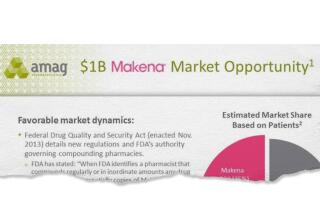ICN Shares Off 23% on FDA’s Drug Rejection : Medicines: Agency finds Virazole is not a safe and effective treatment for hepatitis C. Tumble is second in recent months.
- Share via
Shares of ICN Pharmaceuticals Inc. fell 23% in heavy New York Stock Exchange trading Friday after the company said the U.S. Food and Drug Administration would not approve its Virazole drug as a treatment for hepatitis C.
The Costa Mesa-based company’s stock price fell $5.25 to $17.38. Trading topped 1.99 million shares, nearly 10 times the issue’s three-month daily average of 205,600. ICN was Friday’s biggest percentage loser in NYSE trading.
The stock’s tumble was its second in recent months as a result of negative news about Virazole. It fell $2.875 to $19.125 in early December after ICN said the FDA had asked it to resubmit its application for the drug.
On Friday, ICN reported that the FDA had informed the company that Virazole was “not approvable because the data submitted did not demonstrate (it) to be safe and effective for the treatment of hepatitis C viral infections.”
The agency has also directed the company to discontinue studies of Virazole as a treatment for hepatitis C, a highly contagious and potentially fatal liver disease that afflicts about 150,000 Americans annually.
ICN officials said Friday that the company still believes Virazole can be effective against hepatitis C and that it will file a new application that pairs the compound with interferon, naturally occurring proteins that boost the immune system. Executives said they have begun talks with makers of interferon, which is sometimes used to treat hepatitis B.
However, ICN also acknowledged that the FDA had described the investigation of Virazole and interferon as “a relatively problematic” procedure.
ICN said it intends to continue pursuing regulatory approval of Virazole in European markets and that it is now “responding to various comment letters from regulators in the European Union.” The company said the prevalence of hepatitis C in Europe and Japan is “significantly larger” than in the United States.
“They’ve got no choice in the matter, given the tens of millions they’ve spent so far,” said David Anast, publisher of the Costa Mesa-based Biomedical Market Newsletter. “They have to pursue foreign markets.”
ICN has established a presence in Eastern Europe and Russia with its Yugoslav-based ICN Galenika subsidiary and a controlling interest in the St. Petersburg-based Leningrad Industrial Chemical & Pharmaceutical Assn., one of Russia’s oldest drug firms. The company has said it wants to position itself for future market growth in former Communist countries.
More to Read
Inside the business of entertainment
The Wide Shot brings you news, analysis and insights on everything from streaming wars to production — and what it all means for the future.
You may occasionally receive promotional content from the Los Angeles Times.








